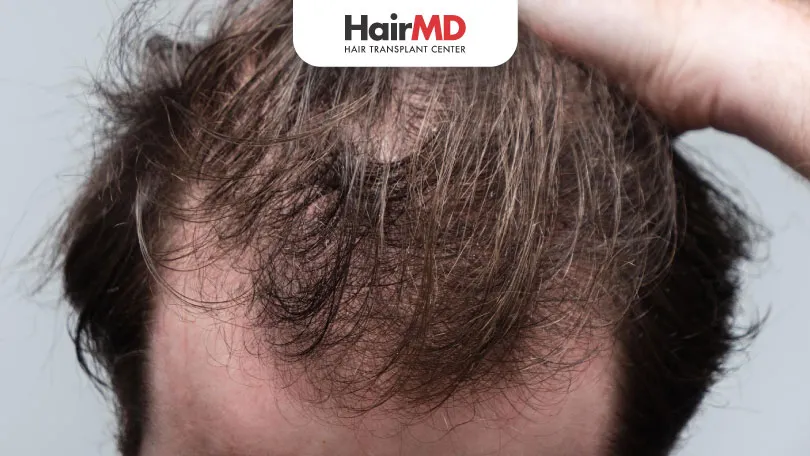12th March, 2024

What’s covered in the article?
- What is telogen effluvium hair loss?
- What are the causes of telogen effluvium?
- Conclusion
What is telogen effluvium hair loss?
Telogen effluvium is considered the second most common form of hair loss diagnosed by dermatologists, that occurs when there’s an increase in the number of hair follicles in the falling or telogen phase of the hair growth cycle.
It is one of the most common causes of temporary hair loss that occurs as a result of excessive shedding of resting or telogen hair after some shock to the system. Once the precipitating cause is removed, new hair typically will regrow.
Telogen effluvium is a nonscarring, non-inflammatory hair loss of relatively sudden onset caused by physiologic or emotional stress with no clinical or histological evidence of inflammation and can affect up to 50% of the scalp hair. In this condition, the hair in the growing phase is suddenly converted into resting telogen hair due to some shock, and this hair eventually falls off. An increased hair fall is noticed 2 to 4 months after the triggering event.

Paradoxically hair fall can be actually a sign of hair growth in telogen effluvium, as most of the time, as the stressor is corrected, it is the new hair which pushes out the old dead hair causing hair fall. As this occurs, a fine fringe of new hair is often evident along the forehead hairline. At first, the fall of club hairs is profuse, and a general thinning of the scalp hair may become evident, but after several months a peak is reached, and hair fall begins to decrease, gradually taking its original place in over 6–9 months in most cases. As the hair fall tapers off, the scalp thickens back up to normal. However, the recovery may be incomplete in some patients when the underlying cause is not corrected properly.
Telogen effluvium can affect people of all age groups and both sexes, though women have a greater tendency to experience this condition because of postpartum hormonal changes. Also, women are more disturbed by hair shedding than men and are more likely to seek medical attention.
What are the causes of telogen effluvium?
In a normal healthy person’s scalp, about 85% of the hair follicles actively grow hair (anagen hair) and about 15% rest (telogen hair). It is normal to lose up to about 100 hairs a day on one’s comb, brush, basin, or on the pillow due to the normal scalp hair cycle. However, if there is some shock to the system, as many as 70% of the anagen hairs can be precipitated into telogen, thus reversing the usual ratio.
Typical triggers of telogen effluvium hair loss include:
- Postpartum hair loss
- Acute or chronic illness, especially if accompanied by high fever
- Surgical operation
- Accident
- Psychological stress
- Weight loss, unhealthy diet, or nutritional deficiency (eg, iron or potassium deficiency)
- Certain medications
- Endocrine disorders (e.g., hypothyroidism, hyperthyroidism)
- Discontinuing the contraceptive pill
- Excessive exposure to the sun
Telogen effluvium hair loss isn’t permanent. Although your hair will likely take the shape of its usual growth pattern within six months, it may take from one year to 18 months before your hair returns to its original appearance. During this time, it is always a good idea to support your hair with proper hair care and nutrition.
Do You Know?
Nearly 250 Patients Visit HairMD
Everyday For Various Hair Concerns?
(Your journey to healthier and fuller hair starts here!)
Meet Our Dermatologists
Conclusion
Further Reading
Everything you need to know about Laser Hair Removal
Learn everything about laser hair removal, including benefits, procedure, and aftercare tips.
Ultimate Food Guide For Healthy Hair
Discover the Food For Healthy Hair. Learn how nutrients like biotin, zinc, and omega-3 fatty acids contribute to hair strength and shine.
Top Reasons Behind Hair Loss in Young Adults and How to Fix It!
The top reasons for hair loss in young adults, including genetic factors, hormonal imbalances, stress, lifestyle choices, nutritional deficiencies, & medical conditions.
Topical Finasteride – A Revolutionary Approach to Hair Loss Treatment
Learn how topical finasteride combats hair loss by reducing DHT levels locally with fewer side effects. Visit HairMD Clinic Pune for expert solutions.
Have thoughts? Please let us know
We are committed not only to treating you, but also educating you.











